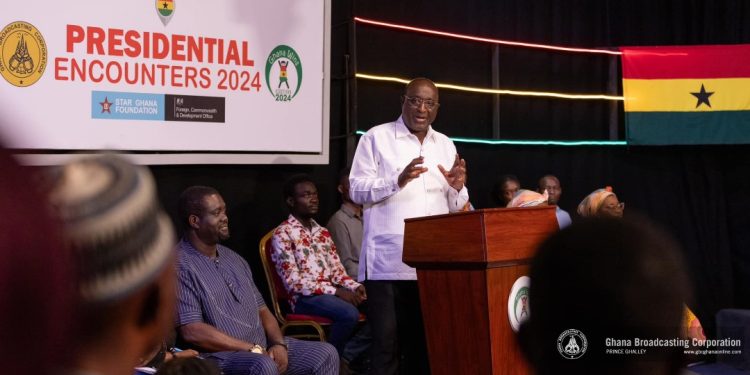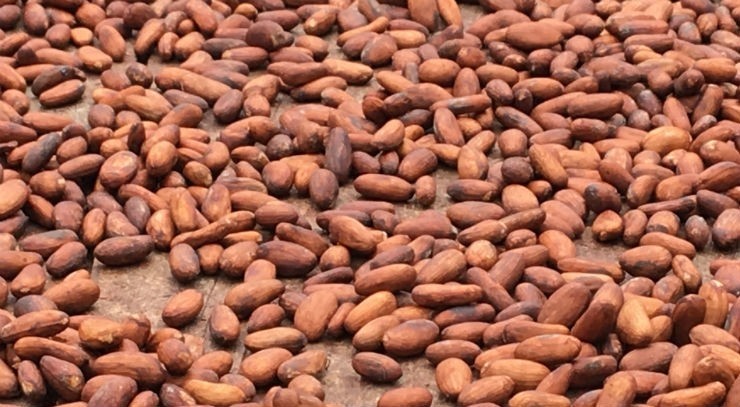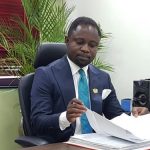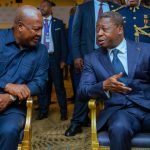Founder and Leader of the Movement for Change, Alan Kyerematen, has committed to reducing the excessive powers vested in the President by Ghana’s Constitution, deeming them unacceptable.

In a statement during the Presidential encounters hosted by the Ghana Broadcasting Corporation (GBC) on 22nd November 2024, Kyerematen emphasized his intent to bring about significant change. “Yes, I am contesting to become president, but I intend to review the Constitution to reduce the powers of the president before I become the president,” he affirmed.
As part of his Great Transformational Plan (GTP), Mr. Kyerematen outlined substantial reforms aimed at decentralizing governance, curbing presidential influence, and establishing a more balanced system of power.
A central component of his proposed reforms is the creation of a Second Chamber of Parliament. This chamber would include representatives from various sectors, including traditional authorities, religious leaders, youth groups, women, business communities, labor unions, and other stakeholders.
The body’s key role would be to approve nominations for vital positions such as the Chief Justice, Electoral Commissioner, and heads of security agencies.
Mr. Kyerematen stressed that the current system, where the President directly appoints these figures, undermines their independence. “How can you expect complete freedom for these institutions when their heads are appointed by the President? This system must change to reflect true democracy,” he argued.
Additionally, Alan Kyerematen reaffirmed his commitment to a zero-tolerance approach to corruption, beginning with leadership by example. He plans to strengthen anti-corruption legislation and establish an independent anti-corruption agency with prosecutorial powers, distinct from the Attorney General’s Office.
To ensure the body’s autonomy, he proposed that an anti-corruption Czar be appointed by the Second Chamber of Parliament, not the President. “The anti-corruption Czar must derive their authority from the Constitution, not the presidency,” he stressed. He criticized the overlap between the Attorney General and anti-corruption agencies, adding, “It is improper for the Attorney General to oversee the work of the anti-corruption Czar, as it compromises the independence of the office. This must change to ensure accountability at all levels.”
Mr. Kyerematen accused the NDC and NPP of perpetuating corruption, stating, “Corruption remains rife because the NDC and NPP governments are not genuinely interested in fighting it. They have created a system where corruption fuels their political machinery, leaving the nation to suffer the consequences.”
On the galamsey menace, Mr. Kyerematen accused both the NDC and NPP of having vested interests that prevent decisive action. “Both parties have shown no commitment to ending galamsey because they have benefitted directly or indirectly from this illegal activity,” he charged.
He pledged to reform Article 257 of the Constitution to make traditional authorities co-trustees of natural resources. He explained, “It is illogical for the Minerals Commission to grant mining licenses without consulting chiefs, who are custodians of the land.”
Mr. Kyerematen also committed to addressing inequities in compensation under Article 71, which grants significant retirement benefits to a select group of public officials. He criticized the disparity, stating, “How can we justify these benefits when teachers, health workers, and others who serve for decades retire on paltry pensions? This is unacceptable, and my government will review these provisions to ensure fairness.”
Mr. Kyerematen underscored the need for constitutional reforms to combat entrenched corruption and strengthen democratic governance. These changes, coupled with his anti-corruption and decentralization agenda, aim to create a more inclusive governance structure, according to him. He concluded, “I do not seek the presidency to hoard power but to share it with the people and institutions that will strengthen our democracy.”
























































![[FREE FREE MONEY] Predict and Win a Guaranteed GH¢200 From Us EVERY WEEK](https://wordpress.ghanatalksradio.com/wp-content/uploads/2022/02/Predict-and-Win-Final-09-03-2021-218x150.jpg)
![[Predict & Win – 8th/Oct.] WIN A Guaranteed ¢200 From Us This Week](https://wordpress.ghanatalksradio.com/wp-content/uploads/2021/10/maxresdefault-16-218x150.jpg)
![[Predict & Win – 2nd] WIN A Guaranteed ¢200 From Us This Week](https://wordpress.ghanatalksradio.com/wp-content/uploads/2021/09/maxresdefault-50-218x150.jpg)
![[Predict & Win – 25th] WIN A Guaranteed ¢200 From Us This Week](https://wordpress.ghanatalksradio.com/wp-content/uploads/2021/09/maxresdefault-36-218x150.jpg)
![[Predict & Win – 18th] WIN A Guaranteed ¢200 From Us This Week](https://wordpress.ghanatalksradio.com/wp-content/uploads/2021/09/maxresdefault-23-218x150.jpg)






![[National cathedral] See full list of churches that have contributed since 2018](https://wordpress.ghanatalksradio.com/wp-content/uploads/2020/09/Ghana-National-Cathedral-GhanaTalksRadio-100x70.jpg)



